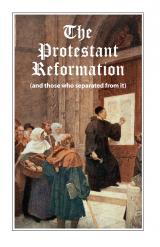
Protestant Reformation
Martin Luther, John Calvin, and several others are recognized as the fathers of the Protestant Reformation.1 The word fathers used this way means those who originate or institute something. They surely did so, bringing about one of world history’s most important revolutions. They split up the international Church of Rome and replaced it with national, or state churches, mainly in northern Europe. They are known as the magisterial reformers.
For historians and theologians, this name serves two purposes. First, it identifies their cooperation with the princes and governing authorities of their realms, which they thought necessary for the success of their reforms. Secondly, it distinguishes them from the radical reformers, who are much less well-known figures – men like the Anabaptists Conrad Grebel and Menno Simons.
These radicals, also known as evangelicals, had departed from the historic foundation of Christianity laid by the emperor Constantine and the
popes as to the proper relationship between church, state, and society. What had happened twelve centuries before with Constantine was (and in many ways, still is) the normal condition by which Christians judge their participation in the world.